Assessment: Problems of Start-up Businesses in the Initial Phase
VerifiedAdded on 2023/04/19
|13
|2283
|152
Report
AI Summary
This report identifies and analyzes the factors that contribute to the failure of start-up businesses in their initial phases. It highlights issues such as lack of resources, financial instability, insufficient skilled workforce, and inadequate marketing strategies. The research employs a qualitative approach, utilizing secondary data from online journals, articles, books, and government databases to explore these challenges. The study emphasizes the importance of a well-structured business plan and effective communication strategies to mitigate these problems. Ultimately, the report aims to provide insights and recommendations for entrepreneurs to overcome these initial hurdles and establish successful and sustainable businesses. Desklib provides access to similar solved assignments and past papers for students.
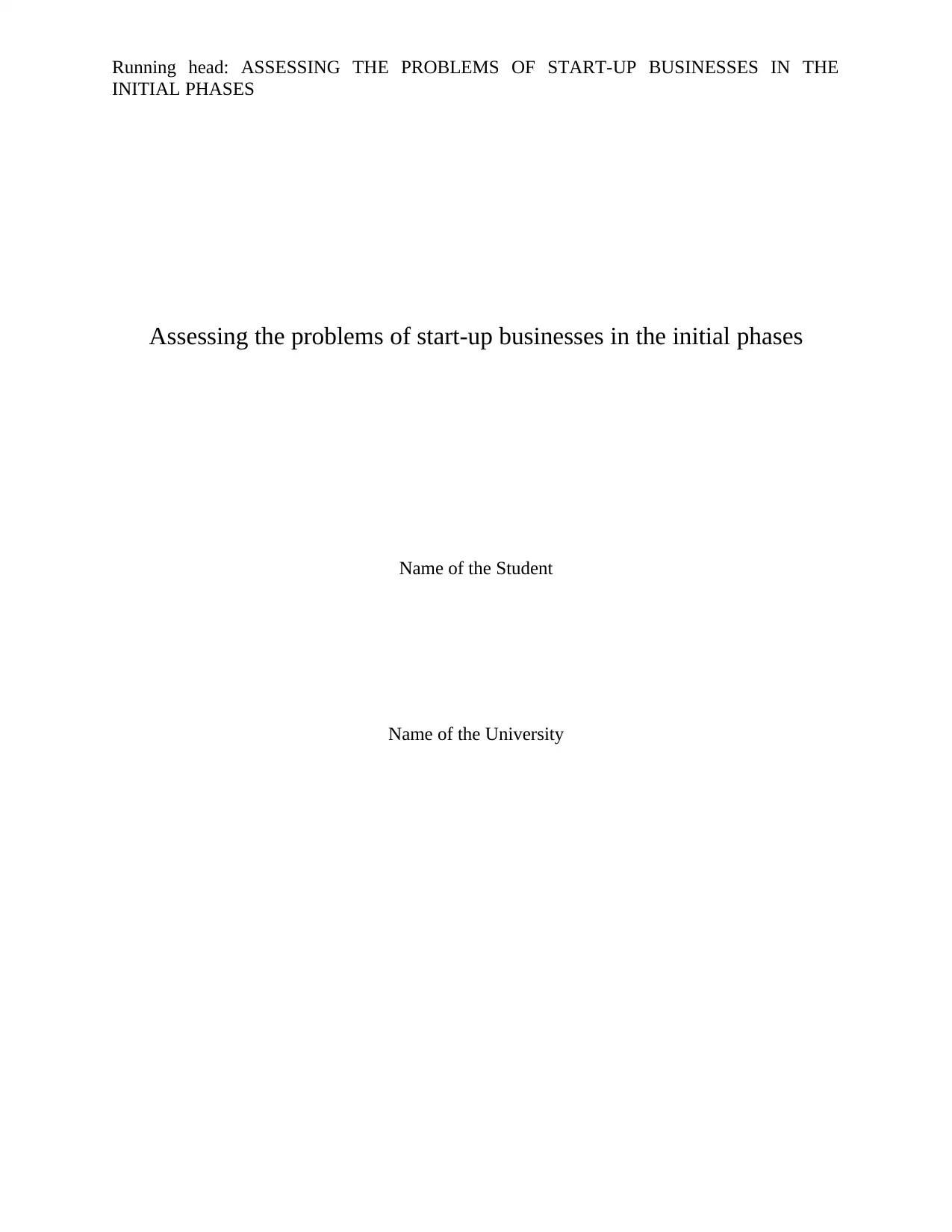
Running head: ASSESSING THE PROBLEMS OF START-UP BUSINESSES IN THE
INITIAL PHASES
Assessing the problems of start-up businesses in the initial phases
Name of the Student
Name of the University
INITIAL PHASES
Assessing the problems of start-up businesses in the initial phases
Name of the Student
Name of the University
Paraphrase This Document
Need a fresh take? Get an instant paraphrase of this document with our AI Paraphraser
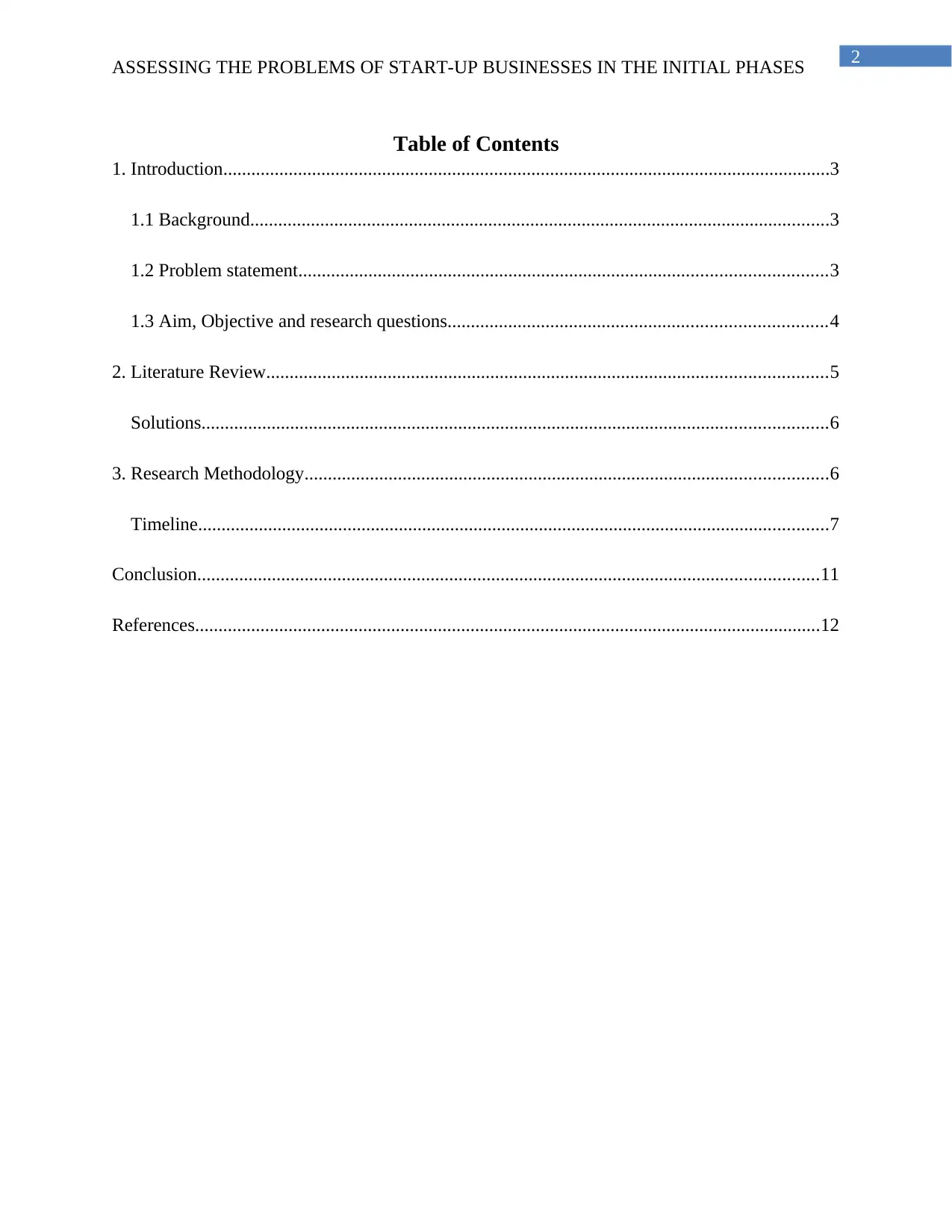
2
ASSESSING THE PROBLEMS OF START-UP BUSINESSES IN THE INITIAL PHASES
Table of Contents
1. Introduction..................................................................................................................................3
1.1 Background............................................................................................................................3
1.2 Problem statement.................................................................................................................3
1.3 Aim, Objective and research questions.................................................................................4
2. Literature Review........................................................................................................................5
Solutions......................................................................................................................................6
3. Research Methodology................................................................................................................6
Timeline.......................................................................................................................................7
Conclusion.....................................................................................................................................11
References......................................................................................................................................12
ASSESSING THE PROBLEMS OF START-UP BUSINESSES IN THE INITIAL PHASES
Table of Contents
1. Introduction..................................................................................................................................3
1.1 Background............................................................................................................................3
1.2 Problem statement.................................................................................................................3
1.3 Aim, Objective and research questions.................................................................................4
2. Literature Review........................................................................................................................5
Solutions......................................................................................................................................6
3. Research Methodology................................................................................................................6
Timeline.......................................................................................................................................7
Conclusion.....................................................................................................................................11
References......................................................................................................................................12
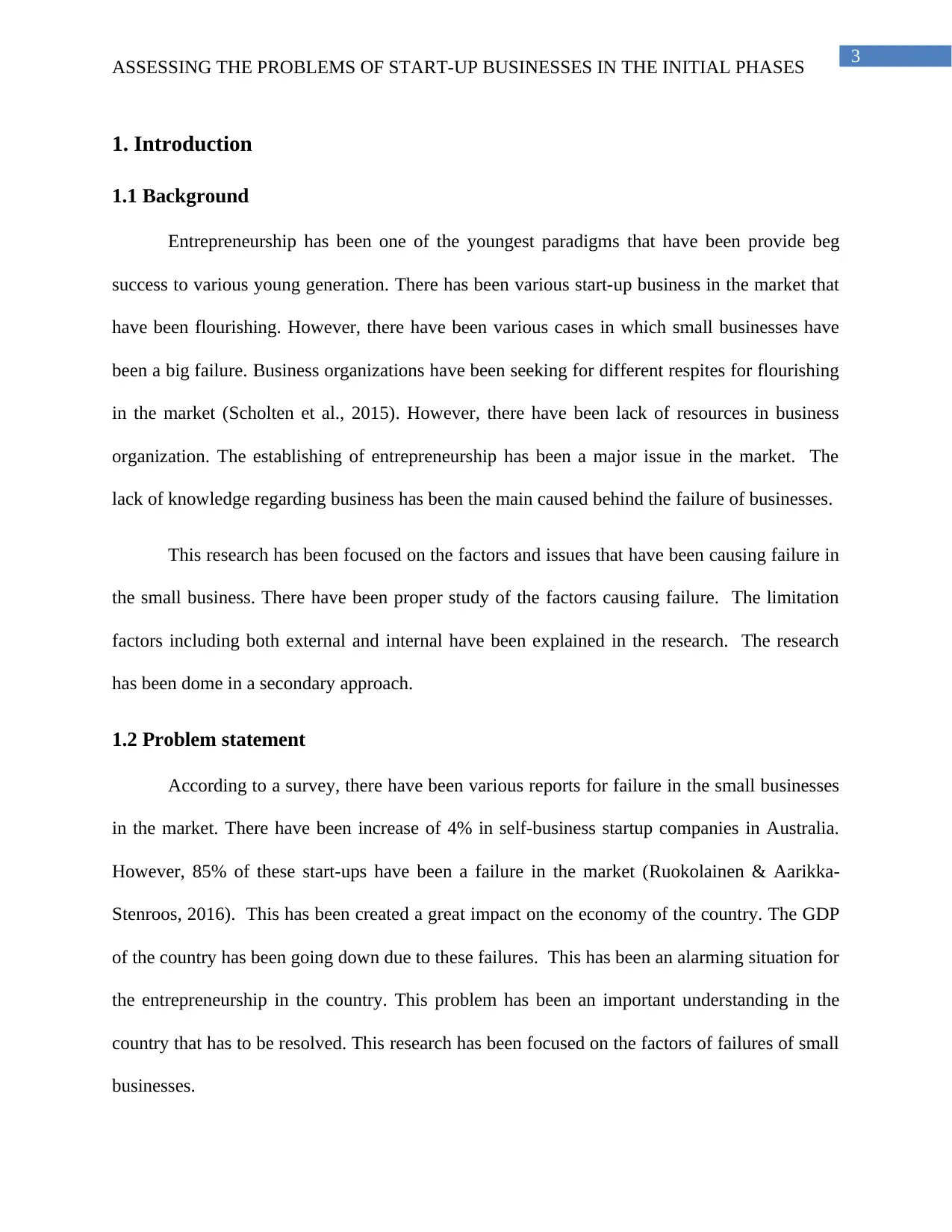
3
ASSESSING THE PROBLEMS OF START-UP BUSINESSES IN THE INITIAL PHASES
1. Introduction
1.1 Background
Entrepreneurship has been one of the youngest paradigms that have been provide beg
success to various young generation. There has been various start-up business in the market that
have been flourishing. However, there have been various cases in which small businesses have
been a big failure. Business organizations have been seeking for different respites for flourishing
in the market (Scholten et al., 2015). However, there have been lack of resources in business
organization. The establishing of entrepreneurship has been a major issue in the market. The
lack of knowledge regarding business has been the main caused behind the failure of businesses.
This research has been focused on the factors and issues that have been causing failure in
the small business. There have been proper study of the factors causing failure. The limitation
factors including both external and internal have been explained in the research. The research
has been dome in a secondary approach.
1.2 Problem statement
According to a survey, there have been various reports for failure in the small businesses
in the market. There have been increase of 4% in self-business startup companies in Australia.
However, 85% of these start-ups have been a failure in the market (Ruokolainen & Aarikka-
Stenroos, 2016). This has been created a great impact on the economy of the country. The GDP
of the country has been going down due to these failures. This has been an alarming situation for
the entrepreneurship in the country. This problem has been an important understanding in the
country that has to be resolved. This research has been focused on the factors of failures of small
businesses.
ASSESSING THE PROBLEMS OF START-UP BUSINESSES IN THE INITIAL PHASES
1. Introduction
1.1 Background
Entrepreneurship has been one of the youngest paradigms that have been provide beg
success to various young generation. There has been various start-up business in the market that
have been flourishing. However, there have been various cases in which small businesses have
been a big failure. Business organizations have been seeking for different respites for flourishing
in the market (Scholten et al., 2015). However, there have been lack of resources in business
organization. The establishing of entrepreneurship has been a major issue in the market. The
lack of knowledge regarding business has been the main caused behind the failure of businesses.
This research has been focused on the factors and issues that have been causing failure in
the small business. There have been proper study of the factors causing failure. The limitation
factors including both external and internal have been explained in the research. The research
has been dome in a secondary approach.
1.2 Problem statement
According to a survey, there have been various reports for failure in the small businesses
in the market. There have been increase of 4% in self-business startup companies in Australia.
However, 85% of these start-ups have been a failure in the market (Ruokolainen & Aarikka-
Stenroos, 2016). This has been created a great impact on the economy of the country. The GDP
of the country has been going down due to these failures. This has been an alarming situation for
the entrepreneurship in the country. This problem has been an important understanding in the
country that has to be resolved. This research has been focused on the factors of failures of small
businesses.
⊘ This is a preview!⊘
Do you want full access?
Subscribe today to unlock all pages.

Trusted by 1+ million students worldwide
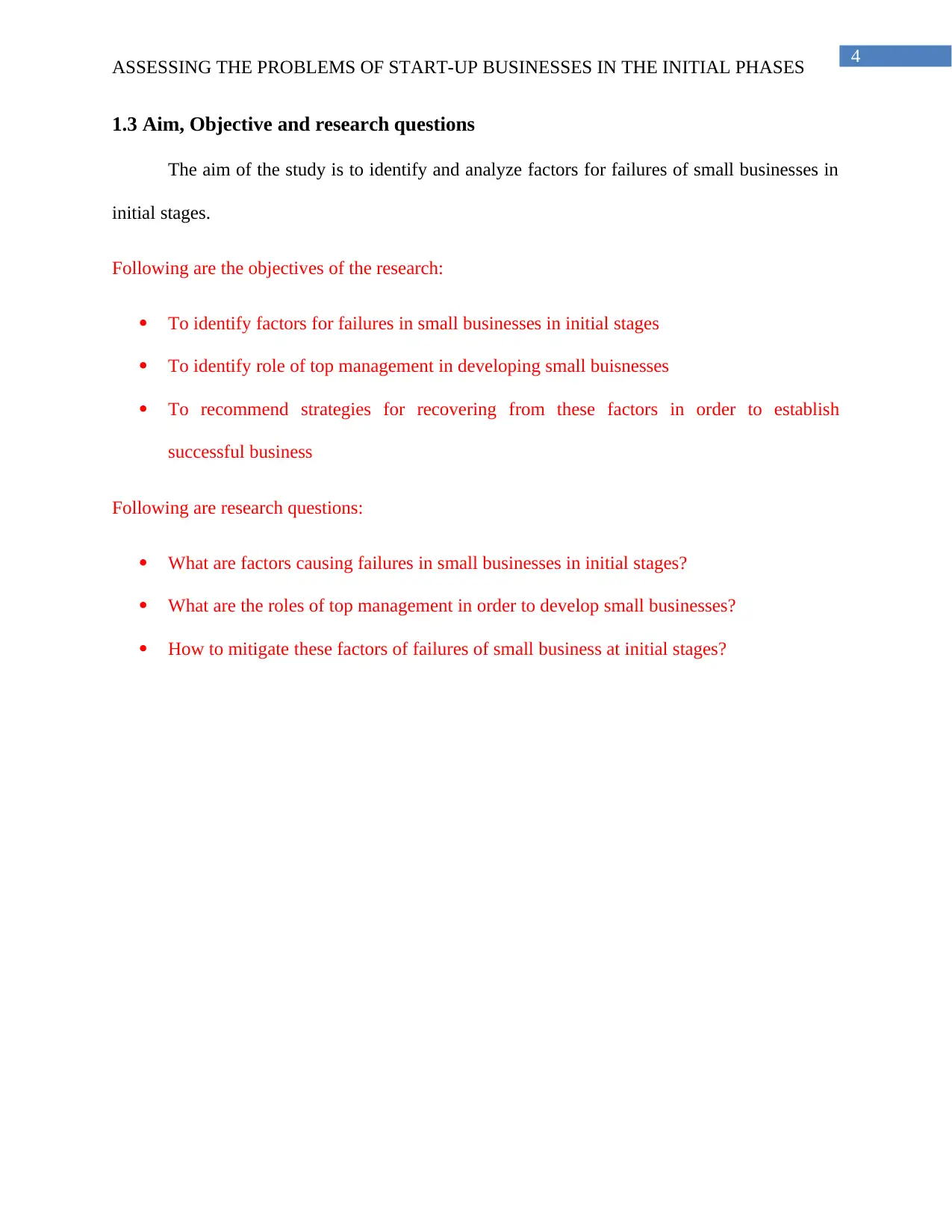
4
ASSESSING THE PROBLEMS OF START-UP BUSINESSES IN THE INITIAL PHASES
1.3 Aim, Objective and research questions
The aim of the study is to identify and analyze factors for failures of small businesses in
initial stages.
Following are the objectives of the research:
To identify factors for failures in small businesses in initial stages
To identify role of top management in developing small buisnesses
To recommend strategies for recovering from these factors in order to establish
successful business
Following are research questions:
What are factors causing failures in small businesses in initial stages?
What are the roles of top management in order to develop small businesses?
How to mitigate these factors of failures of small business at initial stages?
ASSESSING THE PROBLEMS OF START-UP BUSINESSES IN THE INITIAL PHASES
1.3 Aim, Objective and research questions
The aim of the study is to identify and analyze factors for failures of small businesses in
initial stages.
Following are the objectives of the research:
To identify factors for failures in small businesses in initial stages
To identify role of top management in developing small buisnesses
To recommend strategies for recovering from these factors in order to establish
successful business
Following are research questions:
What are factors causing failures in small businesses in initial stages?
What are the roles of top management in order to develop small businesses?
How to mitigate these factors of failures of small business at initial stages?
Paraphrase This Document
Need a fresh take? Get an instant paraphrase of this document with our AI Paraphraser
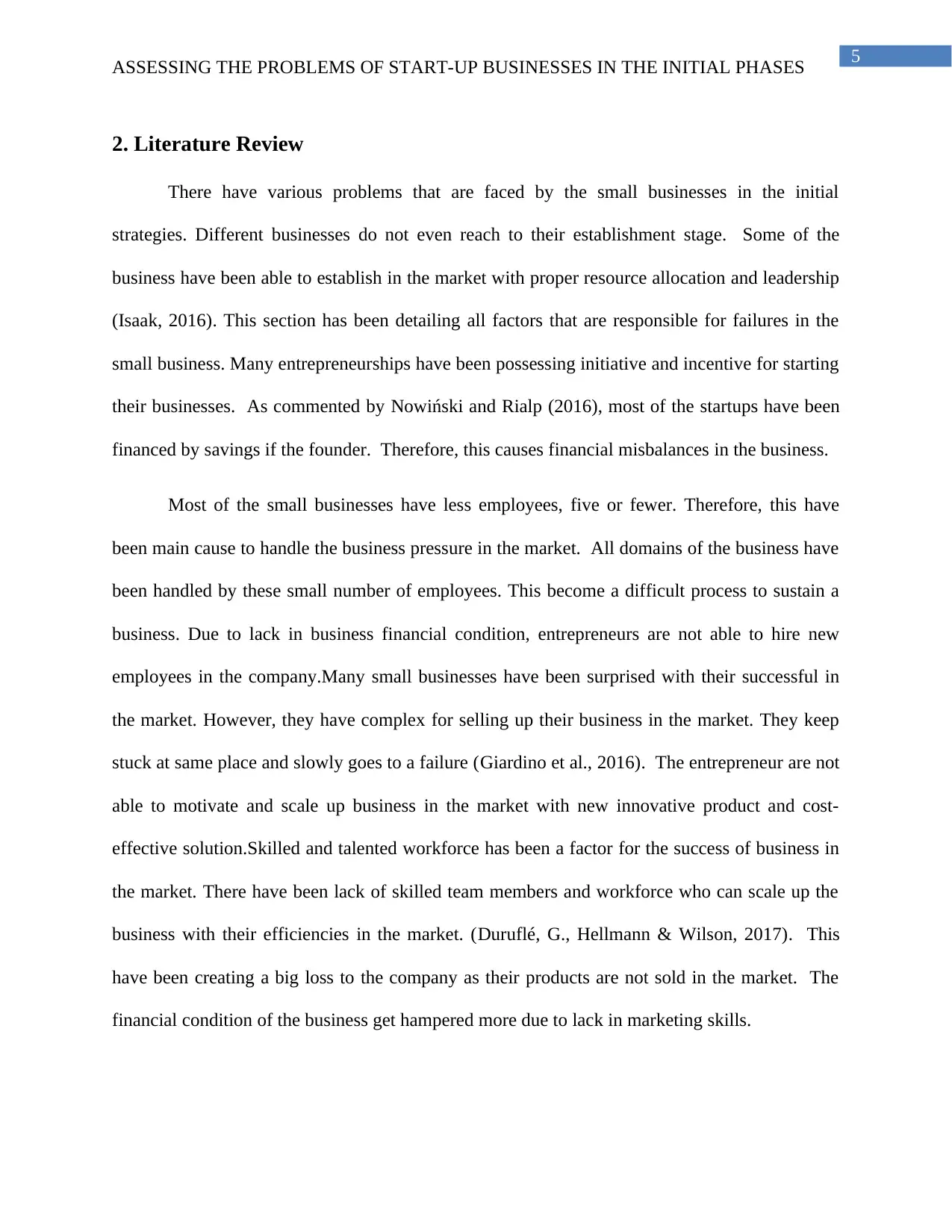
5
ASSESSING THE PROBLEMS OF START-UP BUSINESSES IN THE INITIAL PHASES
2. Literature Review
There have various problems that are faced by the small businesses in the initial
strategies. Different businesses do not even reach to their establishment stage. Some of the
business have been able to establish in the market with proper resource allocation and leadership
(Isaak, 2016). This section has been detailing all factors that are responsible for failures in the
small business. Many entrepreneurships have been possessing initiative and incentive for starting
their businesses. As commented by Nowiński and Rialp (2016), most of the startups have been
financed by savings if the founder. Therefore, this causes financial misbalances in the business.
Most of the small businesses have less employees, five or fewer. Therefore, this have
been main cause to handle the business pressure in the market. All domains of the business have
been handled by these small number of employees. This become a difficult process to sustain a
business. Due to lack in business financial condition, entrepreneurs are not able to hire new
employees in the company.Many small businesses have been surprised with their successful in
the market. However, they have complex for selling up their business in the market. They keep
stuck at same place and slowly goes to a failure (Giardino et al., 2016). The entrepreneur are not
able to motivate and scale up business in the market with new innovative product and cost-
effective solution.Skilled and talented workforce has been a factor for the success of business in
the market. There have been lack of skilled team members and workforce who can scale up the
business with their efficiencies in the market. (Duruflé, G., Hellmann & Wilson, 2017). This
have been creating a big loss to the company as their products are not sold in the market. The
financial condition of the business get hampered more due to lack in marketing skills.
ASSESSING THE PROBLEMS OF START-UP BUSINESSES IN THE INITIAL PHASES
2. Literature Review
There have various problems that are faced by the small businesses in the initial
strategies. Different businesses do not even reach to their establishment stage. Some of the
business have been able to establish in the market with proper resource allocation and leadership
(Isaak, 2016). This section has been detailing all factors that are responsible for failures in the
small business. Many entrepreneurships have been possessing initiative and incentive for starting
their businesses. As commented by Nowiński and Rialp (2016), most of the startups have been
financed by savings if the founder. Therefore, this causes financial misbalances in the business.
Most of the small businesses have less employees, five or fewer. Therefore, this have
been main cause to handle the business pressure in the market. All domains of the business have
been handled by these small number of employees. This become a difficult process to sustain a
business. Due to lack in business financial condition, entrepreneurs are not able to hire new
employees in the company.Many small businesses have been surprised with their successful in
the market. However, they have complex for selling up their business in the market. They keep
stuck at same place and slowly goes to a failure (Giardino et al., 2016). The entrepreneur are not
able to motivate and scale up business in the market with new innovative product and cost-
effective solution.Skilled and talented workforce has been a factor for the success of business in
the market. There have been lack of skilled team members and workforce who can scale up the
business with their efficiencies in the market. (Duruflé, G., Hellmann & Wilson, 2017). This
have been creating a big loss to the company as their products are not sold in the market. The
financial condition of the business get hampered more due to lack in marketing skills.
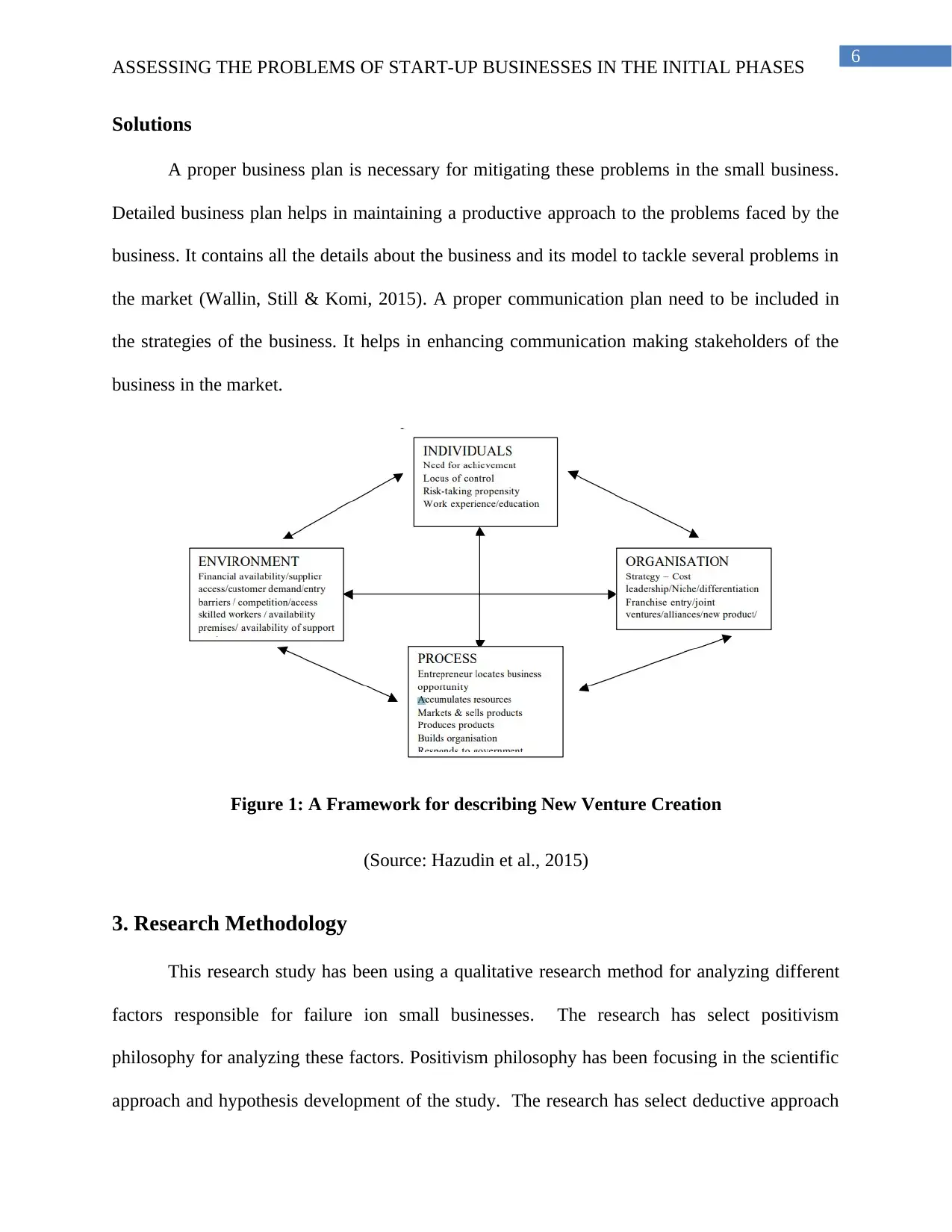
6
ASSESSING THE PROBLEMS OF START-UP BUSINESSES IN THE INITIAL PHASES
Solutions
A proper business plan is necessary for mitigating these problems in the small business.
Detailed business plan helps in maintaining a productive approach to the problems faced by the
business. It contains all the details about the business and its model to tackle several problems in
the market (Wallin, Still & Komi, 2015). A proper communication plan need to be included in
the strategies of the business. It helps in enhancing communication making stakeholders of the
business in the market.
Figure 1: A Framework for describing New Venture Creation
(Source: Hazudin et al., 2015)
3. Research Methodology
This research study has been using a qualitative research method for analyzing different
factors responsible for failure ion small businesses. The research has select positivism
philosophy for analyzing these factors. Positivism philosophy has been focusing in the scientific
approach and hypothesis development of the study. The research has select deductive approach
ASSESSING THE PROBLEMS OF START-UP BUSINESSES IN THE INITIAL PHASES
Solutions
A proper business plan is necessary for mitigating these problems in the small business.
Detailed business plan helps in maintaining a productive approach to the problems faced by the
business. It contains all the details about the business and its model to tackle several problems in
the market (Wallin, Still & Komi, 2015). A proper communication plan need to be included in
the strategies of the business. It helps in enhancing communication making stakeholders of the
business in the market.
Figure 1: A Framework for describing New Venture Creation
(Source: Hazudin et al., 2015)
3. Research Methodology
This research study has been using a qualitative research method for analyzing different
factors responsible for failure ion small businesses. The research has select positivism
philosophy for analyzing these factors. Positivism philosophy has been focusing in the scientific
approach and hypothesis development of the study. The research has select deductive approach
⊘ This is a preview!⊘
Do you want full access?
Subscribe today to unlock all pages.

Trusted by 1+ million students worldwide
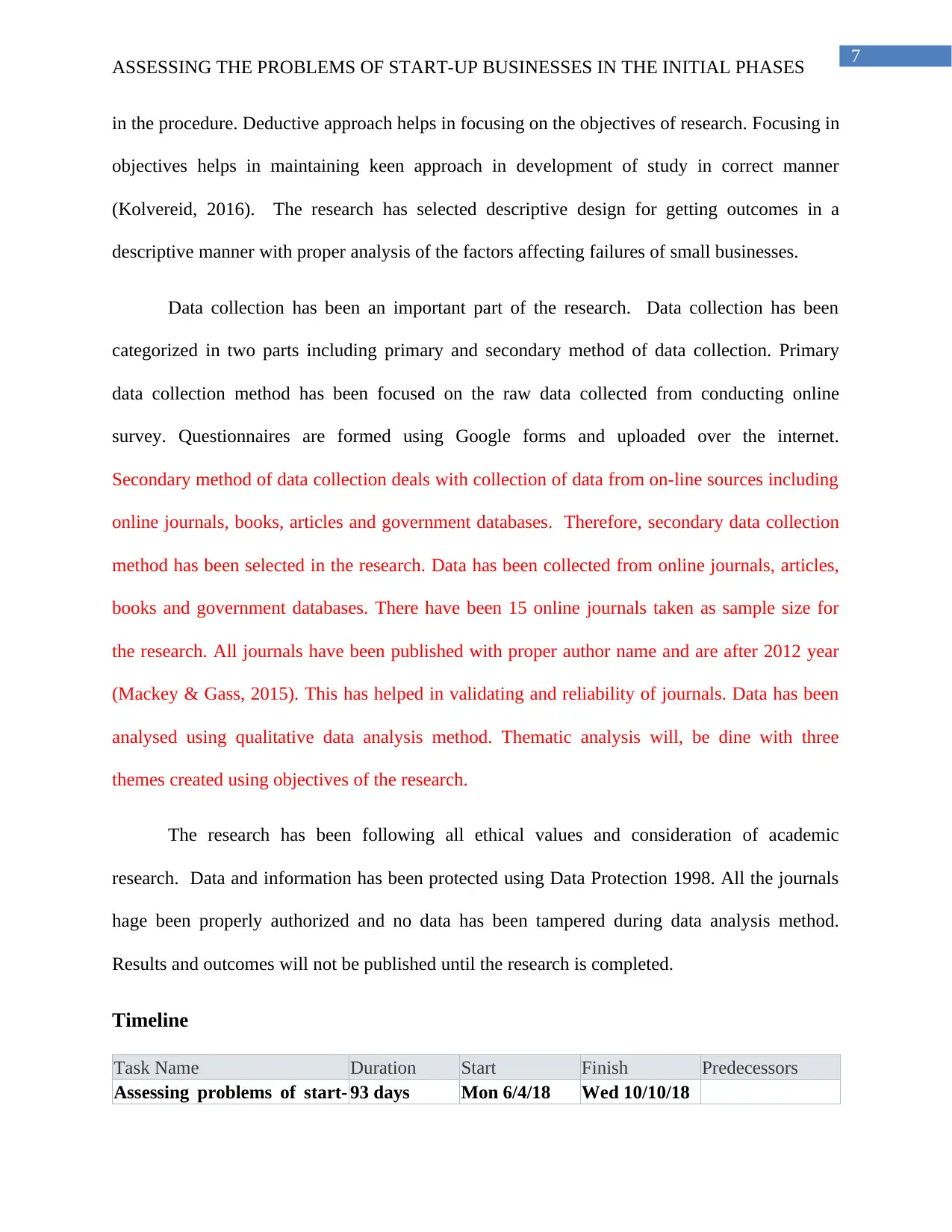
7
ASSESSING THE PROBLEMS OF START-UP BUSINESSES IN THE INITIAL PHASES
in the procedure. Deductive approach helps in focusing on the objectives of research. Focusing in
objectives helps in maintaining keen approach in development of study in correct manner
(Kolvereid, 2016). The research has selected descriptive design for getting outcomes in a
descriptive manner with proper analysis of the factors affecting failures of small businesses.
Data collection has been an important part of the research. Data collection has been
categorized in two parts including primary and secondary method of data collection. Primary
data collection method has been focused on the raw data collected from conducting online
survey. Questionnaires are formed using Google forms and uploaded over the internet.
Secondary method of data collection deals with collection of data from on-line sources including
online journals, books, articles and government databases. Therefore, secondary data collection
method has been selected in the research. Data has been collected from online journals, articles,
books and government databases. There have been 15 online journals taken as sample size for
the research. All journals have been published with proper author name and are after 2012 year
(Mackey & Gass, 2015). This has helped in validating and reliability of journals. Data has been
analysed using qualitative data analysis method. Thematic analysis will, be dine with three
themes created using objectives of the research.
The research has been following all ethical values and consideration of academic
research. Data and information has been protected using Data Protection 1998. All the journals
hage been properly authorized and no data has been tampered during data analysis method.
Results and outcomes will not be published until the research is completed.
Timeline
Task Name Duration Start Finish Predecessors
Assessing problems of start- 93 days Mon 6/4/18 Wed 10/10/18
ASSESSING THE PROBLEMS OF START-UP BUSINESSES IN THE INITIAL PHASES
in the procedure. Deductive approach helps in focusing on the objectives of research. Focusing in
objectives helps in maintaining keen approach in development of study in correct manner
(Kolvereid, 2016). The research has selected descriptive design for getting outcomes in a
descriptive manner with proper analysis of the factors affecting failures of small businesses.
Data collection has been an important part of the research. Data collection has been
categorized in two parts including primary and secondary method of data collection. Primary
data collection method has been focused on the raw data collected from conducting online
survey. Questionnaires are formed using Google forms and uploaded over the internet.
Secondary method of data collection deals with collection of data from on-line sources including
online journals, books, articles and government databases. Therefore, secondary data collection
method has been selected in the research. Data has been collected from online journals, articles,
books and government databases. There have been 15 online journals taken as sample size for
the research. All journals have been published with proper author name and are after 2012 year
(Mackey & Gass, 2015). This has helped in validating and reliability of journals. Data has been
analysed using qualitative data analysis method. Thematic analysis will, be dine with three
themes created using objectives of the research.
The research has been following all ethical values and consideration of academic
research. Data and information has been protected using Data Protection 1998. All the journals
hage been properly authorized and no data has been tampered during data analysis method.
Results and outcomes will not be published until the research is completed.
Timeline
Task Name Duration Start Finish Predecessors
Assessing problems of start- 93 days Mon 6/4/18 Wed 10/10/18
Paraphrase This Document
Need a fresh take? Get an instant paraphrase of this document with our AI Paraphraser
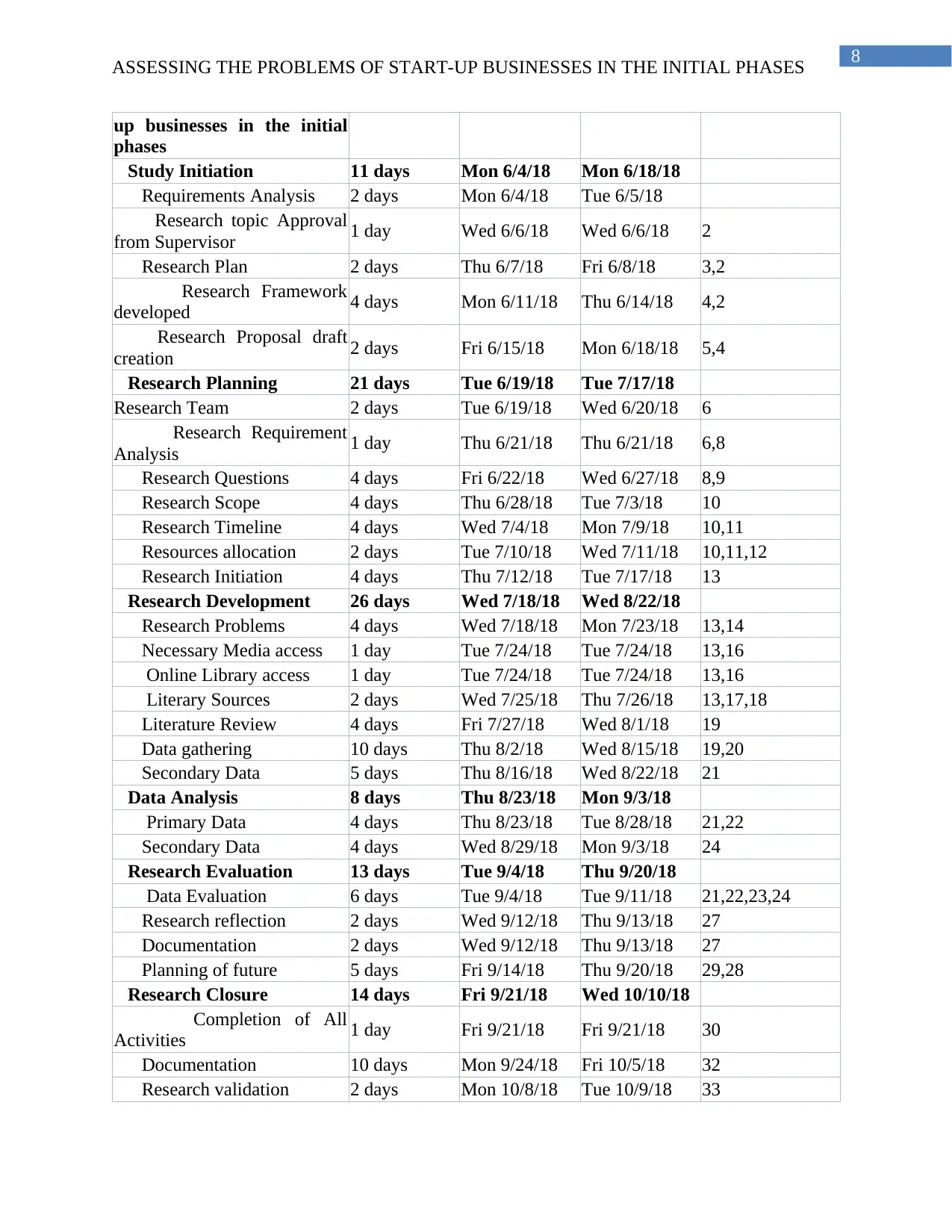
8
ASSESSING THE PROBLEMS OF START-UP BUSINESSES IN THE INITIAL PHASES
up businesses in the initial
phases
Study Initiation 11 days Mon 6/4/18 Mon 6/18/18
Requirements Analysis 2 days Mon 6/4/18 Tue 6/5/18
Research topic Approval
from Supervisor 1 day Wed 6/6/18 Wed 6/6/18 2
Research Plan 2 days Thu 6/7/18 Fri 6/8/18 3,2
Research Framework
developed 4 days Mon 6/11/18 Thu 6/14/18 4,2
Research Proposal draft
creation 2 days Fri 6/15/18 Mon 6/18/18 5,4
Research Planning 21 days Tue 6/19/18 Tue 7/17/18
Research Team 2 days Tue 6/19/18 Wed 6/20/18 6
Research Requirement
Analysis 1 day Thu 6/21/18 Thu 6/21/18 6,8
Research Questions 4 days Fri 6/22/18 Wed 6/27/18 8,9
Research Scope 4 days Thu 6/28/18 Tue 7/3/18 10
Research Timeline 4 days Wed 7/4/18 Mon 7/9/18 10,11
Resources allocation 2 days Tue 7/10/18 Wed 7/11/18 10,11,12
Research Initiation 4 days Thu 7/12/18 Tue 7/17/18 13
Research Development 26 days Wed 7/18/18 Wed 8/22/18
Research Problems 4 days Wed 7/18/18 Mon 7/23/18 13,14
Necessary Media access 1 day Tue 7/24/18 Tue 7/24/18 13,16
Online Library access 1 day Tue 7/24/18 Tue 7/24/18 13,16
Literary Sources 2 days Wed 7/25/18 Thu 7/26/18 13,17,18
Literature Review 4 days Fri 7/27/18 Wed 8/1/18 19
Data gathering 10 days Thu 8/2/18 Wed 8/15/18 19,20
Secondary Data 5 days Thu 8/16/18 Wed 8/22/18 21
Data Analysis 8 days Thu 8/23/18 Mon 9/3/18
Primary Data 4 days Thu 8/23/18 Tue 8/28/18 21,22
Secondary Data 4 days Wed 8/29/18 Mon 9/3/18 24
Research Evaluation 13 days Tue 9/4/18 Thu 9/20/18
Data Evaluation 6 days Tue 9/4/18 Tue 9/11/18 21,22,23,24
Research reflection 2 days Wed 9/12/18 Thu 9/13/18 27
Documentation 2 days Wed 9/12/18 Thu 9/13/18 27
Planning of future 5 days Fri 9/14/18 Thu 9/20/18 29,28
Research Closure 14 days Fri 9/21/18 Wed 10/10/18
Completion of All
Activities 1 day Fri 9/21/18 Fri 9/21/18 30
Documentation 10 days Mon 9/24/18 Fri 10/5/18 32
Research validation 2 days Mon 10/8/18 Tue 10/9/18 33
ASSESSING THE PROBLEMS OF START-UP BUSINESSES IN THE INITIAL PHASES
up businesses in the initial
phases
Study Initiation 11 days Mon 6/4/18 Mon 6/18/18
Requirements Analysis 2 days Mon 6/4/18 Tue 6/5/18
Research topic Approval
from Supervisor 1 day Wed 6/6/18 Wed 6/6/18 2
Research Plan 2 days Thu 6/7/18 Fri 6/8/18 3,2
Research Framework
developed 4 days Mon 6/11/18 Thu 6/14/18 4,2
Research Proposal draft
creation 2 days Fri 6/15/18 Mon 6/18/18 5,4
Research Planning 21 days Tue 6/19/18 Tue 7/17/18
Research Team 2 days Tue 6/19/18 Wed 6/20/18 6
Research Requirement
Analysis 1 day Thu 6/21/18 Thu 6/21/18 6,8
Research Questions 4 days Fri 6/22/18 Wed 6/27/18 8,9
Research Scope 4 days Thu 6/28/18 Tue 7/3/18 10
Research Timeline 4 days Wed 7/4/18 Mon 7/9/18 10,11
Resources allocation 2 days Tue 7/10/18 Wed 7/11/18 10,11,12
Research Initiation 4 days Thu 7/12/18 Tue 7/17/18 13
Research Development 26 days Wed 7/18/18 Wed 8/22/18
Research Problems 4 days Wed 7/18/18 Mon 7/23/18 13,14
Necessary Media access 1 day Tue 7/24/18 Tue 7/24/18 13,16
Online Library access 1 day Tue 7/24/18 Tue 7/24/18 13,16
Literary Sources 2 days Wed 7/25/18 Thu 7/26/18 13,17,18
Literature Review 4 days Fri 7/27/18 Wed 8/1/18 19
Data gathering 10 days Thu 8/2/18 Wed 8/15/18 19,20
Secondary Data 5 days Thu 8/16/18 Wed 8/22/18 21
Data Analysis 8 days Thu 8/23/18 Mon 9/3/18
Primary Data 4 days Thu 8/23/18 Tue 8/28/18 21,22
Secondary Data 4 days Wed 8/29/18 Mon 9/3/18 24
Research Evaluation 13 days Tue 9/4/18 Thu 9/20/18
Data Evaluation 6 days Tue 9/4/18 Tue 9/11/18 21,22,23,24
Research reflection 2 days Wed 9/12/18 Thu 9/13/18 27
Documentation 2 days Wed 9/12/18 Thu 9/13/18 27
Planning of future 5 days Fri 9/14/18 Thu 9/20/18 29,28
Research Closure 14 days Fri 9/21/18 Wed 10/10/18
Completion of All
Activities 1 day Fri 9/21/18 Fri 9/21/18 30
Documentation 10 days Mon 9/24/18 Fri 10/5/18 32
Research validation 2 days Mon 10/8/18 Tue 10/9/18 33

9
ASSESSING THE PROBLEMS OF START-UP BUSINESSES IN THE INITIAL PHASES
Team Sign Off 1 day Wed 10/10/18 Wed 10/10/18 34
ASSESSING THE PROBLEMS OF START-UP BUSINESSES IN THE INITIAL PHASES
Team Sign Off 1 day Wed 10/10/18 Wed 10/10/18 34
⊘ This is a preview!⊘
Do you want full access?
Subscribe today to unlock all pages.

Trusted by 1+ million students worldwide
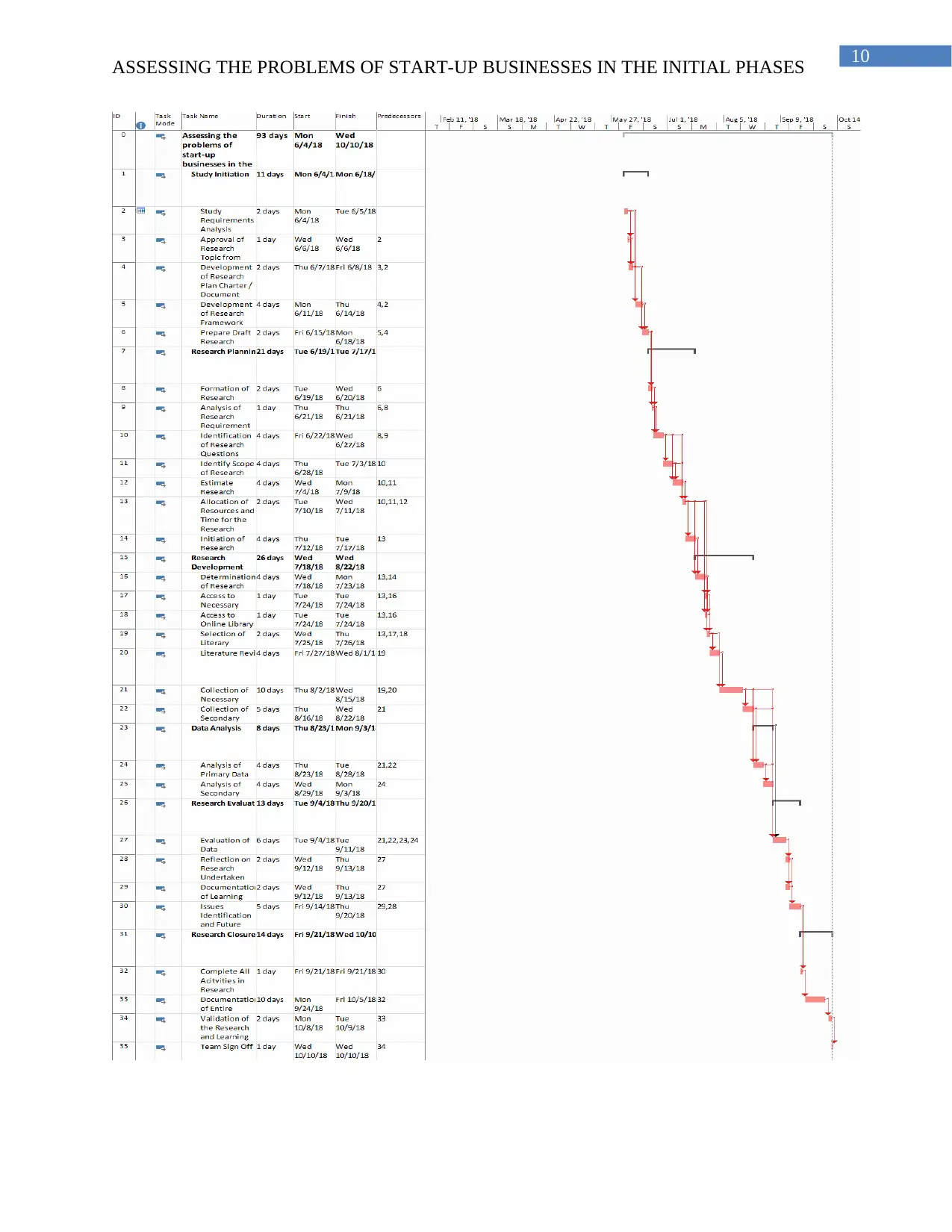
10
ASSESSING THE PROBLEMS OF START-UP BUSINESSES IN THE INITIAL PHASES
ASSESSING THE PROBLEMS OF START-UP BUSINESSES IN THE INITIAL PHASES
Paraphrase This Document
Need a fresh take? Get an instant paraphrase of this document with our AI Paraphraser
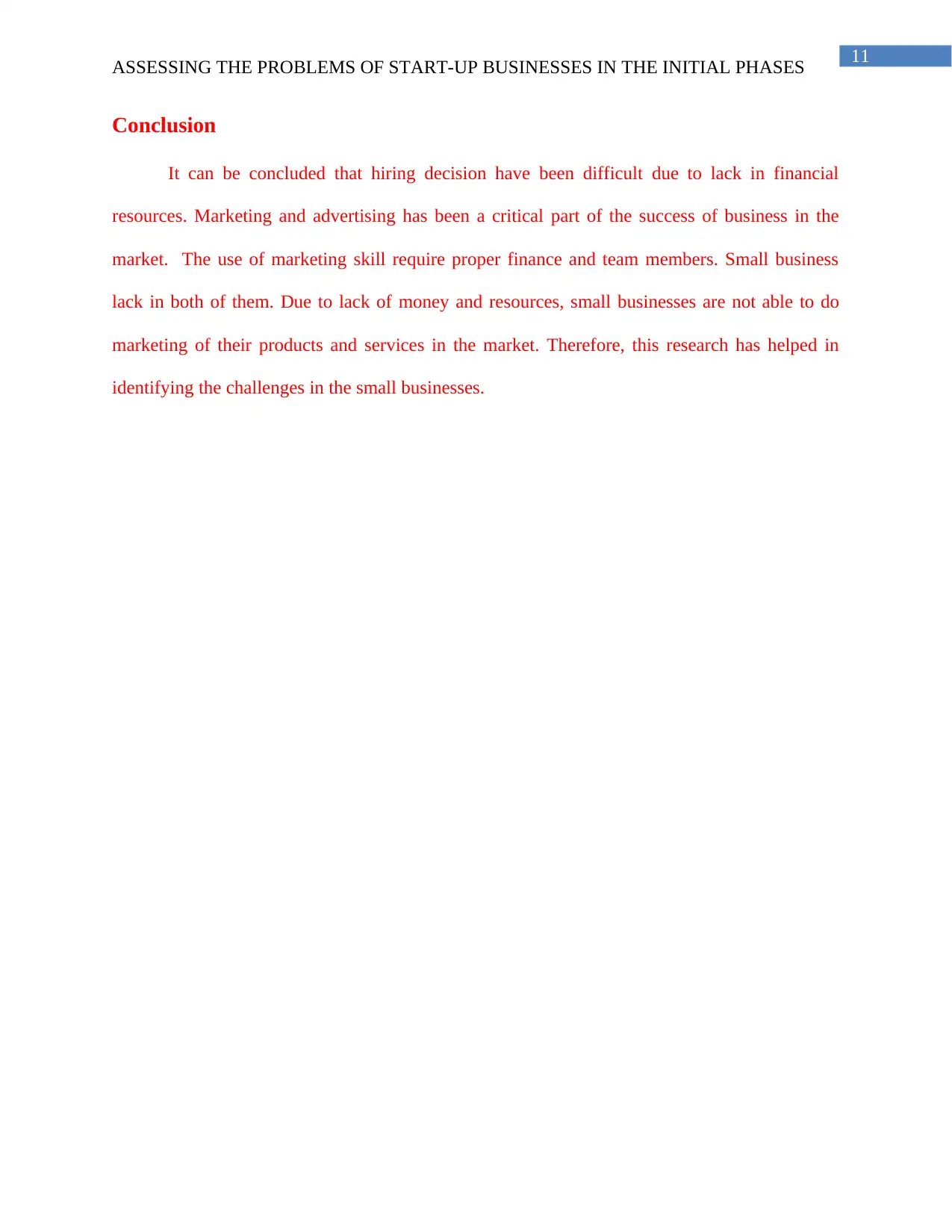
11
ASSESSING THE PROBLEMS OF START-UP BUSINESSES IN THE INITIAL PHASES
Conclusion
It can be concluded that hiring decision have been difficult due to lack in financial
resources. Marketing and advertising has been a critical part of the success of business in the
market. The use of marketing skill require proper finance and team members. Small business
lack in both of them. Due to lack of money and resources, small businesses are not able to do
marketing of their products and services in the market. Therefore, this research has helped in
identifying the challenges in the small businesses.
ASSESSING THE PROBLEMS OF START-UP BUSINESSES IN THE INITIAL PHASES
Conclusion
It can be concluded that hiring decision have been difficult due to lack in financial
resources. Marketing and advertising has been a critical part of the success of business in the
market. The use of marketing skill require proper finance and team members. Small business
lack in both of them. Due to lack of money and resources, small businesses are not able to do
marketing of their products and services in the market. Therefore, this research has helped in
identifying the challenges in the small businesses.
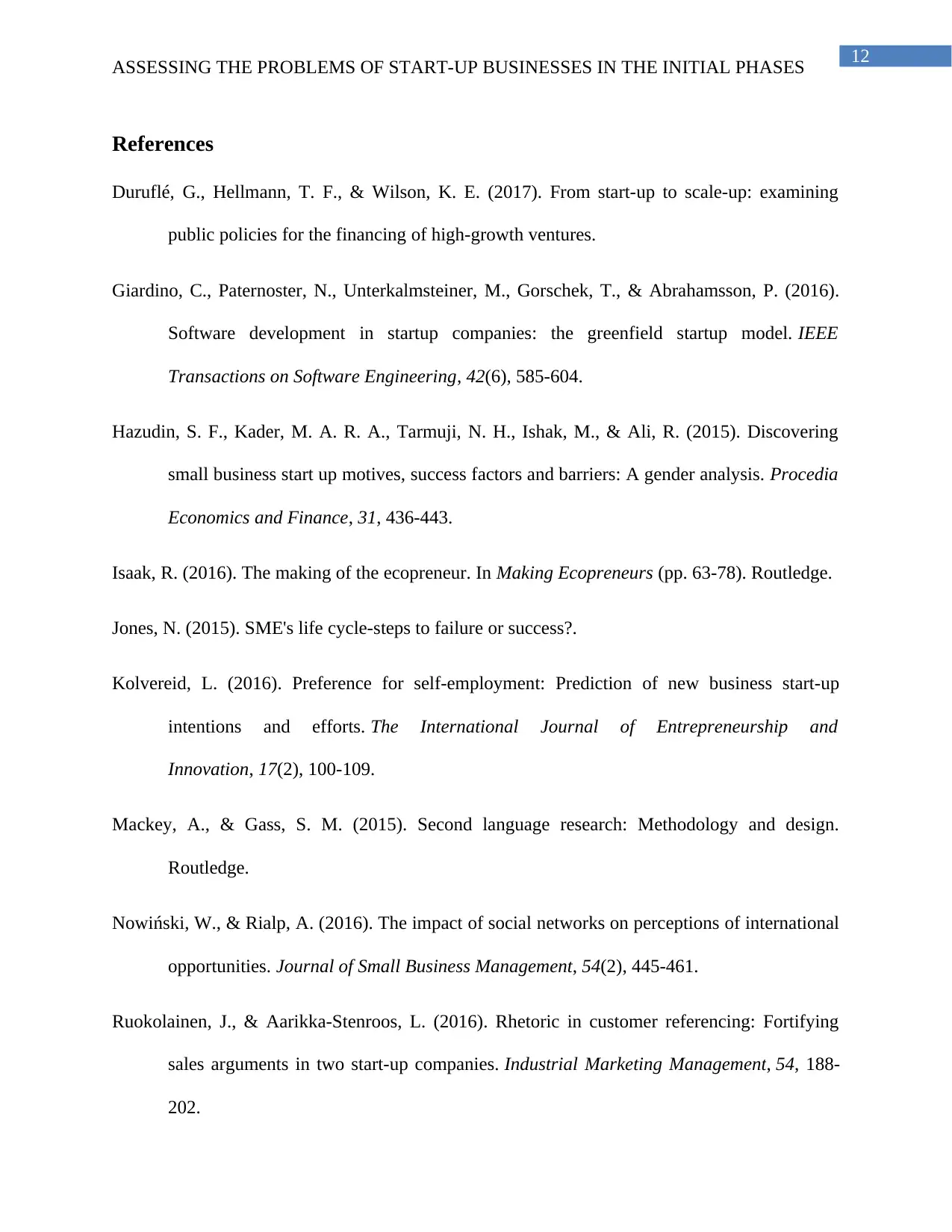
12
ASSESSING THE PROBLEMS OF START-UP BUSINESSES IN THE INITIAL PHASES
References
Duruflé, G., Hellmann, T. F., & Wilson, K. E. (2017). From start-up to scale-up: examining
public policies for the financing of high-growth ventures.
Giardino, C., Paternoster, N., Unterkalmsteiner, M., Gorschek, T., & Abrahamsson, P. (2016).
Software development in startup companies: the greenfield startup model. IEEE
Transactions on Software Engineering, 42(6), 585-604.
Hazudin, S. F., Kader, M. A. R. A., Tarmuji, N. H., Ishak, M., & Ali, R. (2015). Discovering
small business start up motives, success factors and barriers: A gender analysis. Procedia
Economics and Finance, 31, 436-443.
Isaak, R. (2016). The making of the ecopreneur. In Making Ecopreneurs (pp. 63-78). Routledge.
Jones, N. (2015). SME's life cycle-steps to failure or success?.
Kolvereid, L. (2016). Preference for self-employment: Prediction of new business start-up
intentions and efforts. The International Journal of Entrepreneurship and
Innovation, 17(2), 100-109.
Mackey, A., & Gass, S. M. (2015). Second language research: Methodology and design.
Routledge.
Nowiński, W., & Rialp, A. (2016). The impact of social networks on perceptions of international
opportunities. Journal of Small Business Management, 54(2), 445-461.
Ruokolainen, J., & Aarikka-Stenroos, L. (2016). Rhetoric in customer referencing: Fortifying
sales arguments in two start-up companies. Industrial Marketing Management, 54, 188-
202.
ASSESSING THE PROBLEMS OF START-UP BUSINESSES IN THE INITIAL PHASES
References
Duruflé, G., Hellmann, T. F., & Wilson, K. E. (2017). From start-up to scale-up: examining
public policies for the financing of high-growth ventures.
Giardino, C., Paternoster, N., Unterkalmsteiner, M., Gorschek, T., & Abrahamsson, P. (2016).
Software development in startup companies: the greenfield startup model. IEEE
Transactions on Software Engineering, 42(6), 585-604.
Hazudin, S. F., Kader, M. A. R. A., Tarmuji, N. H., Ishak, M., & Ali, R. (2015). Discovering
small business start up motives, success factors and barriers: A gender analysis. Procedia
Economics and Finance, 31, 436-443.
Isaak, R. (2016). The making of the ecopreneur. In Making Ecopreneurs (pp. 63-78). Routledge.
Jones, N. (2015). SME's life cycle-steps to failure or success?.
Kolvereid, L. (2016). Preference for self-employment: Prediction of new business start-up
intentions and efforts. The International Journal of Entrepreneurship and
Innovation, 17(2), 100-109.
Mackey, A., & Gass, S. M. (2015). Second language research: Methodology and design.
Routledge.
Nowiński, W., & Rialp, A. (2016). The impact of social networks on perceptions of international
opportunities. Journal of Small Business Management, 54(2), 445-461.
Ruokolainen, J., & Aarikka-Stenroos, L. (2016). Rhetoric in customer referencing: Fortifying
sales arguments in two start-up companies. Industrial Marketing Management, 54, 188-
202.
⊘ This is a preview!⊘
Do you want full access?
Subscribe today to unlock all pages.

Trusted by 1+ million students worldwide
1 out of 13
Related Documents
Your All-in-One AI-Powered Toolkit for Academic Success.
+13062052269
info@desklib.com
Available 24*7 on WhatsApp / Email
![[object Object]](/_next/static/media/star-bottom.7253800d.svg)
Unlock your academic potential
Copyright © 2020–2026 A2Z Services. All Rights Reserved. Developed and managed by ZUCOL.



